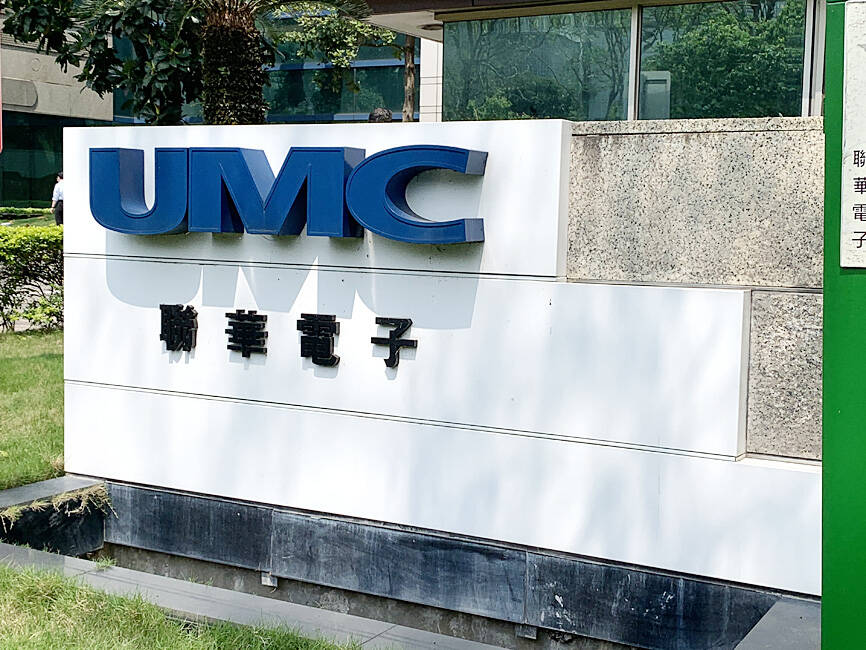Foundry service provider United Microelectronic Corp (UMC, 聯電) yesterday reported the weakest net profit in nearly 3 years due to prolonged inventory correction, but it is seeing a pick-up in demand for communication and computer devices to help drive wafer shipments by 3 percent sequentially this quarter.
Net profit plunged 35.4 percent to NT$10.46 billion (US$321.6 million) in the first quarter of the year, compared with NT$16.18 billion a year earlier, making it the worst quarterly performance since the first quarter of 2021.
On a quarterly basis, net profit declined 20.8 percent from NT$13.2 billion, the Hsinchu-based foundry service provider said.

Photo: Grace Hung, Taipei Times
Earnings per share dropped to NT$0.84 during the January-to-March quarter, from NT$1.31 a year ago and NT$1.06 a quarter earlier, it said.
“For this quarter, we expect an increase in wafer shipments as the inventory situation in the computing, consumer and communication segments improves,” UMC co-president Jason Wang (王石) told investors via a virtual conference.
The firm expects 28-nanometer chip shipments to pick up this quarter, from a dip last quarter caused by weak smartphone demand, and the utilization rate of 28-nanometer operations — the biggest revenue contributor — to stay relatively healthy for the remainder of this year due to rising demand for OLED driver ICs and Wi-Fi chips, Wang said.
The contract chipmaker said its average selling price would hold firm in the coming quarters and gross margin is expected to hover at about 30 percent this year.
Factory utilization would stay at about 65 percent this quarter, Wang said, adding that the company lacks sufficient information to predict when its factory utilization would climb to 70 percent, as customers have adopted a more conservative approach to building inventory.
Overall, UMC holds a cautiously optimistic view about this year and expects to outperform the global foundry industry, Wang said.
The company maintains its forecast that the world semiconductor industry would grow about 5 percent this year, driven mainly by artificial intelligence (AI) servers, he added.
UMC has a relatively small exposure to advanced chips running on AI models, Wang said.
The company focuses more on developing chips used on edge-AI devices handling data transmission and power management, he said.
However, the company offers silicone interposers used in advanced packaging technology in AI servers, which helped boost the company’s specialty technology to account for 57 percent of its total revenue last quarter, he added.
UMC is sticking to its projected capital spending for this year of US$3.3 billion, with a major portion of the budget going on its Singapore fab, he said.
The company has rescheduled the volume production of its Singapore fab to January 2026, from April next year, given current market dynamics and customer alignment, Wang said.
The Singapore fab is primarily to produce auto chips, he added.

Taiwan Semiconductor Manufacturing Co (TSMC, 台積電) secured a record 70.2 percent share of the global foundry business in the second quarter, up from 67.6 percent the previous quarter, and continued widening its lead over second-placed Samsung Electronics Co, TrendForce Corp (集邦科技) said on Monday. TSMC posted US$30.24 billion in sales in the April-to-June period, up 18.5 percent from the previous quarter, driven by major smartphone customers entering their ramp-up cycle and robust demand for artificial intelligence chips, laptops and PCs, which boosted wafer shipments and average selling prices, TrendForce said in a report. Samsung’s sales also grew in the second quarter, up

LIMITED IMPACT: Investor confidence was likely sustained by its relatively small exposure to the Chinese market, as only less advanced chips are made in Nanjing Taiwan Semiconductor Manufacturing Co (TSMC, 台積電) saw its stock price close steady yesterday in a sign that the loss of the validated end user (VEU) status for its Nanjing, China, fab should have a mild impact on the world’s biggest contract chipmaker financially and technologically. Media reports about the waiver loss sent TSMC down 1.29 percent during the early trading session yesterday, but the stock soon regained strength and ended at NT$1,160, unchanged from Tuesday. Investors’ confidence in TSMC was likely built on its relatively small exposure to the Chinese market, as Chinese customers contributed about 9 percent to TSMC’s revenue last

On Tuesday, US President Donald Trump weighed in on a pressing national issue: The rebranding of a restaurant chain. Last week, Cracker Barrel, a Tennessee company whose nationwide locations lean heavily on a cozy, old-timey aesthetic — “rocking chairs on the porch, a warm fire in the hearth, peg games on the table” — announced it was updating its logo. Uncle Herschel, the man who once appeared next to the letters with a barrel, was gone. It sparked ire on the right, with Donald Trump Jr leading a charge against the rebranding: “WTF is wrong with Cracker Barrel?!” Later, Trump Sr weighed

LOOPHOLES: The move is to end a break that was aiding foreign producers without any similar benefit for US manufacturers, the US Department of Commerce said US President Donald Trump’s administration would make it harder for Samsung Electronics Co and SK Hynix Inc to ship critical equipment to their chipmaking operations in China, dealing a potential blow to the companies’ production in the world’s largest semiconductor market. The US Department of Commerce in a notice published on Friday said that it was revoking waivers for Samsung and SK Hynix to use US technologies in their Chinese operations. The companies had been operating in China under regulations that allow them to import chipmaking equipment without applying for a new license each time. The move would revise what is known